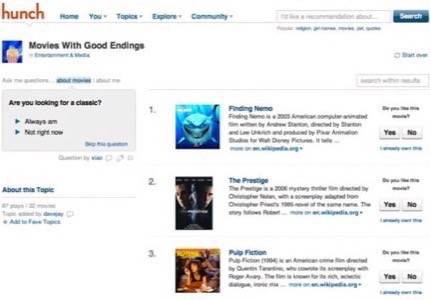Caterina Fake was one of the co-founders of Flickr, an iconic web 2.0 online photo service that was sold to Yahoo. Her latest product is Hunch, a service that started out as a Q&A service but is now being positioned as a personalization service. It’s basically a recommendation engine that shows you movies you want to see, books you want to read, vacation destinations you want to go to, and much more. Fake and her three co-founders at Hunch – Chris Dixon, Tom Pinckney and Matt Dattis – are on a mission to “map every person on the Internet to every object on the Internet, be that a product, a service, or a person.”

I spoke to Caterina Fake to find out how Hunch got started and the progress the company has made in its ambitious mission.
Richard MacManus:
How was the product conceived and what was the inspiration for it?
Caterina Fake: It goes back a little bit to when I was still at Yahoo. I decided the most interesting thing going on there was search. I took my social media, user-generated content background and tried to use that as a lens through which to look at search.
“We created, as a kind of exhaust from our system, a profile of each user.”
I briefly worked on Yahoo! Answers while I was at Yahoo, as well as a bunch of other social search products. And there was a sense that this was one direction that social [search] can take. There was an explosion of sites like Quora and Aardvark. I think the crucial turning point in the way things were evolving was in April of this year, the [Facebook] F8 conference – for us anyway. That was a very significant thing. Facebook announced their “Like” button and an implementation of that across their site and across the web. And using that data in a recommendations. Then Amazon and Google started playing in the same space. There was just a lot going on in that general direction.
I think the most important thing for an entrepreneur is to pick a good problem and find a solution to it. We picked search as a problem to solve and then we just iterated. We launched a decision tree model, based on expert systems (which has been around since the 80s) and we built a whole series of decision trees. The content is mostly user-generated. We launched with about 500 and it was an alternative to search. It was a way of getting a little bit further down the search funnel.
So the kind of thinking behind this was: you could do a search, but you could also get a bit further [because] we will give you results that will give you instantaneously what would otherwise take you several hours of research to do properly.

One of the things that we did, and this was the kind of innovation that we actually did before our launch, was a section of the site that asked questions about you. There are questions about your demographics, your politics, your taste, your beliefs and values – those kinds of things. It’s deliberately based on the design of Hot or Not. People were enjoying themselves so much answering the questions that the average user answers over 150 questions. We’ve got 60 million, now probably approaching 70 million, questions answered from that module. We were able to map that to people’s taste. And so we created, as a kind of exhaust from our system, a profile of each user.
We learned that it was an extraordinarily valuable thing to build, because then you could actually skip most of the questions on a decision tree – because we’ll take you straight to the answer that we assume is your preference.
RM: So the questions started as just one feature of the product, but it’s turned into the foundation of the product?
CF: Exactly. What had been a subordinate feature became the heart of the product. And that is what we are currently focused on.
Hunch could become “your own personalized navigation ball.”
So, we now have profiles on millions of people and are applying those anywhere on the web. For example, we should be able to use it in Foursquare to determine what restaurant you should go to. Once somebody knows you, or as in this case our system knows, it should be able to become your own personalized navigation ball.
RM: Is there a particular target audience that you are going after?
CF: The way that we’re approaching things right now is that we’re developing partnerships with various companies. We are approaching verticals, learning as much as we can about each vertical and how that applies to what we call the taste graph. Then using that knowledge through people’s recommendations of results. So we’re in the throes of tons of tons of learning. We are kind of like a machine learning shop. Our appetite for data is insatiable.
The thing at which Hunch itself is concerned with is the processing of that data. How do you create a taste graph? How do you figure out the affinity between almost infinite numbers of entities. How you do you constrain them, how do you deliver them in real time, how do you assess the adaptability to each particular user from their idiosyncratic taste profile. We’re concentrating currently on local and shopping. There are a bunch of things that we can then do.
RM:You mentioned Facebook ‘likes’ before. Does Hunch hook into Facebook to get that kind of taste data? Or is that a separate thing which you can’t touch at this point?
CF: When you’re designing a product, your own data is significantly more understandable to you than what I call OPD – Other People’s Data.
Other People’s Data is very difficult to use. You have to really massage it to come up with a good results. When you like something on different systems, that means something different on Rotten Tomatoes and on Facebook and on Hunch and on whatever other service you were using. So, you actually get better results with your own data.
RM: The reason I asked that question was I’m interested in what the scale of the ambition is for Hunch. In a recent Wired article, you’re quoted as saying that the ultimate goal of Hunch is to “connect every person on the internet to every object on the internet.” That is a vast ambition to have…
“We went from doing search to discoveries.”
CF: Oh yes, it is a vast ambition and especially for a start-up that’s only sixteen people. But it’s important to build very ambitious companies and taking on a good problem, because you want to be able to build a great company.
RM: It seems to be a common theme of everybody I’ve spoken to in this series. They’ve all got big ambitions, although their products are also very innovative and forward-looking. So for Hunch, the product changed from the original vision. It started out as a kind of a search product. How do you describe it now, when you’re talking to people?
CF: Well, we went from doing search to discoveries. I think that’s the crucial difference.
With the prior version of the product, you really had to know what you were looking for. In the new instantiation of the product, we’re using the [data from] people who make recommendations in a discovery based product.










